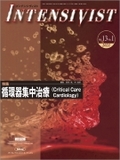Japanese
English
- 有料閲覧
- Abstract 文献概要
- 1ページ目 Look Inside
- 参考文献 Reference
急性心不全の病態は,急性心原性肺水腫,全身的な体液貯留,低心拍出による低灌流,の3つに分かれる。心不全患者に対してこれまで数多くの臨床研究が実施されてきたが,そのなかでもエビデンスレベルが高い報告がなされているのは,急性心原性肺水腫に対する非侵襲的陽圧換気(NPPV)の有用性である。各種ガイドラインにおいても高い推奨度でNPPVを第一選択として使用すべきと記載されている。高流量鼻カニューレ酸素療法(HFNC)やNPPVが奏効しなかった場合の侵襲的人工呼吸器管理などが,その他の呼吸管理方法として選択肢に挙がるが,現状では推奨を検討できるほどのエビデンスの蓄積がない。急性心不全患者におけるNPPV管理を成功させる秘訣はその適応もさることながら,“ただ単にマスクを付ければよい”といった考えを払拭し,NPPVの導入・設定・モニタリング・離脱において適切な方法を用いることである。
Acute heart failure is caused by three mechanisms:acute cardiogenic pulmonary edema (ACPE), systemic fluid retention, and low cardiac output. Noninvasive positive pressure ventilation (NPPV) is frequently used for treatment because of the effects of positive end expiratory pressure (PEEP) and cardiorespiratory interaction. For patients with ACPE, alveolar release by PEEP improves shunting and pulmonary compliance which may lead to resolution of the condition. For patients with low cardiac output cardiorespiratory interaction is divided into three mechanisms:decreasing ventricular preload by positive intrathoracic pressure, decreasing ventricular afterload by decreasing transmural pressure in the systolic phase and decreasing pulmonary vascular resistance by improving hypoxia. These mechanisms may be invoked to improve cardiac output. A number of clinical studies of NPPV have been conducted and high level evidence has been reported regarding the benefits of NPPV in patients with ACPE. Various guidelines also state that NPPV should be used as the first choice based on a high level of evidence. There are other choices instead of NPPV such as high-flow nasal cannula and mechanical ventilation in patients with ACPE, but there is not enough evidence accumulated yet to consider recommendations. The key to successful management of NPPV is to dispel the notion that “just wearing a mask” in addition to thinking properly about the adaptation. Although the level of evidence is not yet high, it is imperative to use appropriate methods for the implementation, setting, monitoring, and withdrawal of NPPV.

Copyright © 2021, MEDICAL SCIENCES INTERNATIONAL, LTD. All rights reserved.


